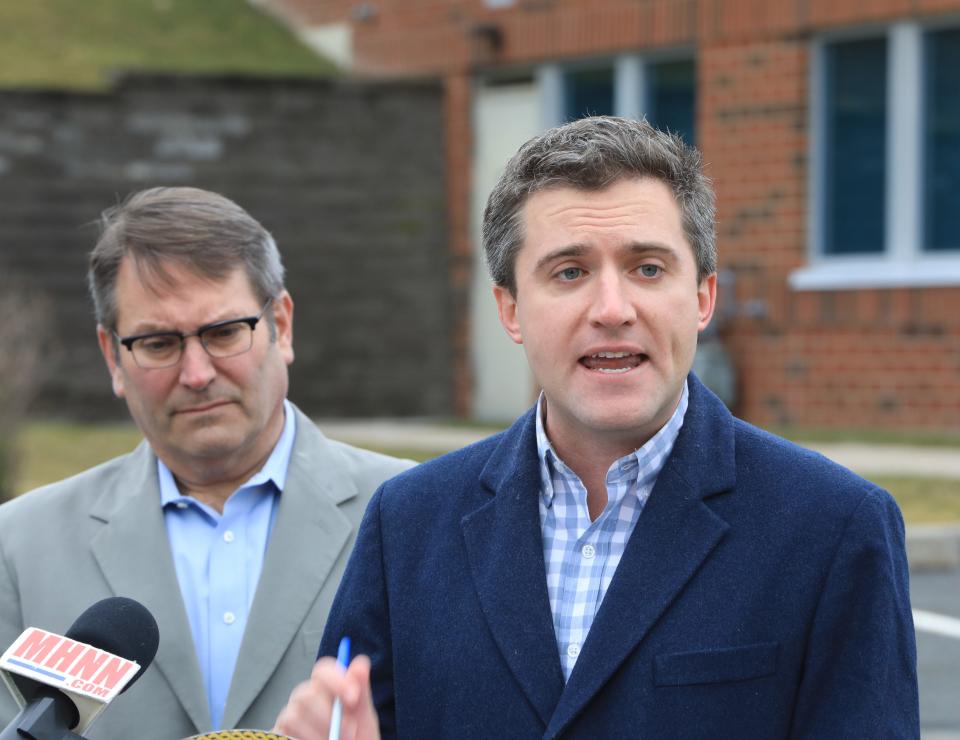NY bill could derail plans to create Hasidic village in Orange County. Here's how
A long-pending plan to form a new Hasidic village next to Kiryas Joel in Orange County could be derailed by a state bill that emerged in the final days of this year's legislative session.
The bill, which the Senate approved Thursday and the Assembly passed on Saturday on its final voting day, would make a few changes in the rules for creating new villages in New York.
How would the NY bill change village creation?
It would raise the fairly low bar for a village by requiring at least 2,000 people to live in the area that would be incorporated, instead of the minimum of just 500 that state law has set for decades.
That higher threshold could effectively block plans to form the village of Seven Springs in the Orange County town of Monroe, since it had only around 600 inhabitants when proposed in 2018. The bill approved by the Senate on Thursday specifies that the legal changes would apply to any pending village petitions.
Whether Gov. Kathy Hochul signs the bill and it poses a new obstacle for Seven Springs remains to be seen.
Appeals denied: Appeals court greenlights next steps to create new Hasidic village in Monroe
Court rulings: Judge restores bid for new village in Monroe
Petition filed: New Hasidic village near KJ being considered
How did Seven Springs proponents react?
Herman Wagschal, the Monroe resident who led the Seven Springs drive, told The Journal News/lohud that he doubted Hochul would sign it - or that the bill would endanger his plans if she did. He argued that his petition has waited so long and survived so many challenges that the new village standards - if enacted - couldn't be enforced against his village petition.
"This case is a case that should have moved four years ago," Wagschal said.
In April, a panel of Appellate Division judges dismissed two court cases objecting to the petition, clearing the way for a referendum to decide its fate. But Monroe officials have since asked the state's highest court - the Court of Appeals - to review the lawsuit they brought, putting the matter on hold again. The Court of Appeals has made no decision yet about whether to hear the case.
NY village bill introduced to reform village creation process
The bill raising the population standard for a new village was introduced last Monday by Sen. James Skoufis, the Cornwall Democrat representing most of Orange County. Assemblyman Fred Thiele, a Long Island Democrat, introduced it in the Assembly.
Skoufis, in a video recorded at the Capitol and posted on Twitter as the Senate wrapped up its business for the year, described the bill as a long-overdue update to village formation rules that were needed statewide.
"There's a hostile village initiative in Orange County that we all know about, but that's not unique," Skoufis said. "There are these new villages popping up all around New York State, and we need new, 2023 laws - not 1800s village incorporation laws - that ensure that these new villages are held accountable, they're sustainable. And so we're pushing to get that signed into law very soon."
Skoufis said earlier that the bill emanated from a recent report by Pace University's Land Use Law Center on reforming the state's village formation rules. Senate Majority Leader Andrea Stewart-Cousins of Yonkers requested that study, and sponsored a separate bill that would create a state commission to make decisions about new villages.

Under current state law, carving a new village out of unincorporated area within a town begins with collecting petition signatures to force a referendum. Only voters in the area that become a village would take part in that vote. If approved, the result is a new municipality with its own government and land-use rules.
In addition to raising the minimum population, the pending bill in Albany would end the ability of large landholders alone to submit a petition. It also adds a study requirement: the petitioners must submit a report on how the proposal would affect the government finances, services and property taxes of the potential villagers and residents in the rest of the town.
Seven Springs proposal born from Kiryas Joel expansion fight
The Seven Springs proposal first emerged in 2017 in the wake of a court battle over efforts to expand Kiryas Joel through annexation. Kiryas Joel wound up annexing from the town of Monroe less than half the 507 acres that were originally proposed, leaving some Hasidic homeowners and landholders unhappy that their properties were excluded.
Forming a new village was another way to separate from Monroe and gain control over land use. The current proposal for the village of Seven Springs was filed in 2018 and has been the subject of court fighting ever since. No referendum has been scheduled or held.
The proposed Village of Seven Springs takes up 1.9 square miles and is larger than densely populated Kiryas Joel, but has only around 600 residents compared to Kiryas Joel's estimated 36,000. Much of the Seven Springs area is undeveloped land.
Chris McKenna covers government and politics for The Journal News and USA Today Network. Reach him at cmckenna@gannett.com.
This article originally appeared on New York State Team: How Orange County Hasidic village proposal could be foiled by NY bill

